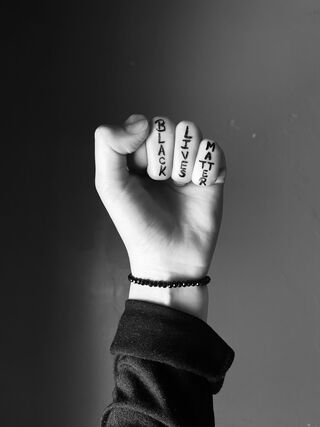Media
Was Chris Harrison Fairly Portrayed in Racial Controversy?
Harrison’s "Bachelor" interview on "Extra" was not as scandalous as portrayed.
Posted March 30, 2021 Reviewed by Chloe Williams
Key points
- Cultural humility is a key concept in furthering racial understanding and inequality that builds off of multicultural competence.
- Advancing social justice agendas requires a discussion that goes far beyond trite social media controversies perpetuated by reality television.
- The Black Lives Matter movement is not about 2018 versus 2021. The 2012 Trayvon Martin cases and countless others like it were just the beginning.
- Discussing overt racism is insufficient. Learning more about racial microaggressions, institutional discrimination, and decolonization practices is also key.

As a longtime viewer of The Bachelor franchise, having written extensively about the seasons over the years, I was eager to watch what I kept hearing was referred to as the explosive interview between the first Black Bachelorette Rachel Lindsay and host Chris Harrison.
I watched the full-length Extra interview in eager anticipation for the conflict, the disagreements, and everything that had allegedly led to Harrison stepping away from the franchise for the first time in its 20-year history. As a multicultural researcher and graduate instructor, I had my pen at the ready to take notes, find the egregious error, and was admittedly disappointed and unable to find major fault or controversy around what Chris Harrison said.
There is an emerging and long-needed discussion of race relations occurring that many of us have been aware of for far too long. Not even a decade ago, I was targeted regularly with hate mail as a result of my articles from this very column when I wrote about protections against hate crime targeting people of color and minorities. Every point I felt was “obvious” (e.g., “racism/homophobia/transphobia/sexism/fatphobia/etc is bad/wrong/unacceptable/incomprehensible”) was staggeringly rejected by an abhorrent number of readers. Needless to say, these issues hit very close to home and my heart.
The Bachelor controversy appears to be twofold. This season of the show was attempting to encapsulate a much larger discussion around race but also directly address what happened with the final contestant on the show. In many ways, both are highly incompatible (even though highly related issues). To put it simply, using Matt James’ final contestant Rachael Kirkconnell as a scapegoat for all that is wrong with society doesn’t even begin to encapsulate hundreds of years of racial oppression, institutional barriers, racism, microaggressions, and social justice issues. In fact, it bastardizes the entire discussion at large.
The issue of a finalist posing at an antebellum-themed party, liking posts related to the confederate flag, and so on, is about the ignorance of one person. Yes, it is symptomatic of a culture at large. But that cannot be conflated with the large issues at hand. When Chris Harrison was defending this contestant, he was ultimately calling for a stop to online bullying, death threats and the extreme vigilante type “justice” that runs rampant on social media. In the Extra interview, Harrison quite aptly stated, “reasonable people aren’t on social media and that’s who you are dealing with.”
Harrison discussed being trolled by social media himself on both sides, some calling him a conservative, others calling him a liberal; he and Lindsay both openly laughed in agreement over the abuse Harrison himself has received via social media. He also shared that as a man in his 50s his ability to handle this is far different from a young woman in her early 20s (mind you, psychological science regularly emphasizes the prefrontal cortex which governs planning and decision making is not fully formed until one’s late 20s — which is also why I’m excited about the senior citizen edition being cast). Ultimately, over and over, Harrison called for “grace” for an uneducated young woman. Frankly, his point was fair. He was not apologizing for her. He asked for her to have time to process and appropriately (rather than impulsively, which is often what the media begs for) respond. None of his statements in the interview pertaining to her came off as out of line.
The second issue the Extra interview attempted to cover was the larger issue of Black Lives Matter. To be frank, I found it to be almost humorous that Harrison and Lindsay discussed the racial culture of today versus 2018, as in my mind they are ultimately one and the same. As I shared earlier, this is not a new issue by any means. The Trayvon Martin shooting of 2012 is only one of countless readily available examples that made national headlines, protests, etc. So in my mind, mention of the racial culture of 2018 is meaningless. That said, the comments seen as most controversial by Harrison involve his discussion of “the woke police.” He stated, “I’m not the woke police,” and said that for a long time, individuals have wanted The Bachelor to address social issues such as bullying and aggression and that that simply is not the role the franchise has ever sought to take on. They have intended to be a reality tv show about finding love exclusive of larger social issues.
While the fairness of this statement is debatable, what I found most striking about the discussion with Lindsay was the amount of cultural humility that Harrison actually showed. Over and over he kept saying “I don’t know.” Should we take down historical monuments? “I don’t know,” he said. Harrison emphasized there are individuals far more qualified than himself in answering these questions. And he is absolutely correct.
The fields studying multicultural and diversity issues are ever rapidly evolving. When I graduated with my Ph.D. in 2012, I studied under one of the early founders of a widely-used multicultural competency assessment measure for healthcare workers. Seven years later when I taught a new multicultural course, I quickly learned the term “competence” had (rightly so) been replaced with “humility” to capture that we are ever-growing, and never can we check the box that says, “yes, now I am multiculturally competent.”
As such, the discussion is a much larger one about education for us all, and one has little expectation that Harrison serve as multicultural scholar and expert. If one actually watches the entire interview and understands the whole context, it becomes clear how the controversy is far more complex and multifaceted than the media has portrayed. Was Kirkconnell in the wrong for her past behaviors? Obviously. Was Harrison in the wrong for asking the media to stop bullying Kirkconnell? No. Was Harrison claiming racial awareness expertise? No.
References
Green-Moton, E & Minkler, M. (2020). Cultural Competence or Cultural Humility? Moving Beyond the Debate. Health Promotion Practice, 21(1) 142-145. https://doi.org/10.1177/1524839919884912


